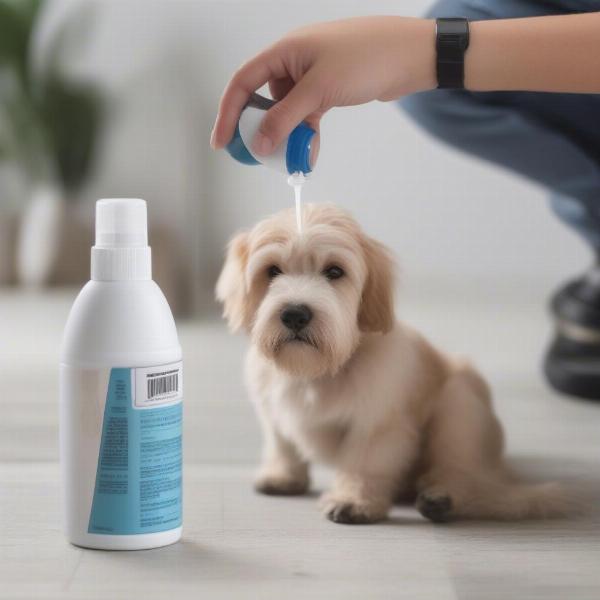Choosing a good flea spray for dogs can feel overwhelming with so many options available. This guide will help you navigate the market, understand the different types of flea sprays, and choose the best one for your furry friend’s specific needs, ensuring they stay happy, healthy, and itch-free. Factors such as your dog’s age, breed, health, and lifestyle will influence the right choice. We’ll cover everything from active ingredients to application methods, helping you make an informed decision.
Understanding Flea Sprays and Their Importance
Fleas are more than just a nuisance. These tiny parasites can cause intense itching, skin irritation, and even transmit diseases. A good flea spray provides effective and quick relief, disrupting the flea life cycle and preventing further infestations. Choosing the right spray involves considering various factors, including the spray’s effectiveness, safety for your dog, and ease of application. It’s essential to understand the different types of flea sprays available and how they work.
 Choosing the Right Flea Spray for Your Dog
Choosing the Right Flea Spray for Your Dog
Types of Flea Sprays for Dogs
There are various types of flea sprays available, each with its own mechanism of action. Some common types include:
- Insect Growth Regulators (IGRs): These sprays prevent flea larvae from developing into adults, breaking the flea life cycle.
- Adulticides: These kill adult fleas on contact, providing immediate relief from infestations.
- Natural Flea Sprays: These sprays often utilize essential oils or botanical ingredients to repel fleas. They may be a good option for dogs with sensitive skin but might not be as effective as chemical options.
- Combination Sprays: These combine adulticides and IGRs for both immediate and long-term protection.
Choosing the Right Flea Spray: Factors to Consider
Several factors should guide your decision when choosing a flea spray for your dog:
- Age and Health: Puppies and senior dogs, or those with underlying health conditions, may require specific formulations. Always consult your vet before using a new product on them.
- Breed and Size: Some sprays are formulated for specific breeds or sizes of dogs.
- Severity of Infestation: A heavy infestation may require a more potent spray than a mild one.
- Lifestyle: If your dog spends a lot of time outdoors, you’ll need a spray that offers long-lasting protection.
- Sensitivity: If your dog has sensitive skin, opt for a hypoallergenic or natural formula.
How to Apply Flea Spray Safely and Effectively
Applying flea spray correctly is crucial for its effectiveness and your dog’s safety. Always follow the manufacturer’s instructions carefully. Here are some general guidelines:
- Protect Yourself: Wear gloves and ensure adequate ventilation.
- Prepare Your Dog: Brush your dog’s coat to remove any loose hair or debris.
- Apply the Spray: Hold the spray bottle a few inches away from your dog’s coat and apply evenly, avoiding the eyes, nose, and mouth.
- Massage into the Coat: Ensure the spray reaches the skin.
- Monitor Your Dog: Observe your dog for any adverse reactions after application.
Conclusion
Choosing a good flea spray for dogs involves understanding your dog’s individual needs and the various products available. By considering the factors discussed above and following the application instructions carefully, you can effectively protect your furry friend from these pesky parasites and keep them happy and healthy. Regular flea prevention is vital for your dog’s well-being.
FAQ
- How often should I apply flea spray to my dog? Always follow the manufacturer’s instructions. Generally, flea sprays are applied every 30-90 days.
- Can I use dog flea spray on my cat? No, never use dog flea spray on a cat. Many flea sprays for dogs contain permethrin, which is toxic to cats.
- What should I do if my dog has an allergic reaction to flea spray? Immediately wash the affected area with soap and water and contact your veterinarian.
- Are natural flea sprays as effective as chemical sprays? Natural flea sprays may repel fleas but might not be as effective as chemical options, especially in cases of heavy infestations.
- Can I use flea spray on pregnant or nursing dogs? Consult your veterinarian before using any flea spray on pregnant or nursing dogs.
- What are the signs of a flea infestation? Excessive scratching, biting, hair loss, and small black specks (flea dirt) on the skin are common signs.
- How can I prevent flea infestations in my home? Regular vacuuming, washing pet bedding, and using flea control products in the environment can help prevent infestations.
ILM Dog is your trusted resource for expert dog care advice. We provide comprehensive guides on dog breeds, health, training, nutrition, grooming, and much more. Whether you’re a seasoned dog owner or just starting your journey, we’re here to help you provide the best possible care for your furry companion. For personalized advice or further assistance, please contact us via email at [email protected] or call us at +44 20-3965-8624. ILM Dog is committed to providing accurate and up-to-date information on all aspects of dog care.